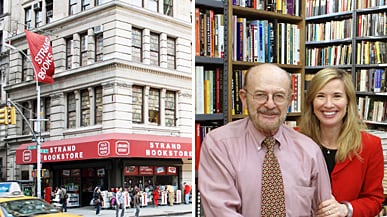If you can keep your head when all about you are losing theirs, you must be doing something right; poetic words the owners of the Strand Bookstore in New York City must have been reciting to themselves after Borders Group Inc. announced last Wednesday their intention to file for Chapter 11 bankruptcy protection with plans to close 30 percent of its bookstores nationwide, including three in Manhattan.
Since the explosion of the Internet and the growing popularity of e-books, bookstores, especially independent bookstores, have been falling like dominoes, even in literary New York. Gotham Book Mart closed in 2006; Coliseum Books met a similar fate in 2007. But the Strand, which swung open its doors in 1927 on famed Book Row on Fourth Avenue between Union Square and Astor Place, is still going strong.

To give you an indication how bookstores once blossomed in New York City; just consider that between 1890 and 1960, there were as many as 40 bookstores on Book Row. Out of the rubble of dwindling bookstores and with e-book sales having swallowed up 15 percent of book sales over the last 15 months alone (according to the Book Industry Study Group), the Strand is still standing with no plans to raise the white flag any time soon. The Strand moved from Book Row to Broadway and East 12th Street around 1956, soon after Fred Bass took over the family-owned business from his father, Benjamin.
In order, then, to find the secret to their success, I posed some questions to Nancy Bass Wyden, who owns the Strand along with her father, Fred Bass.
How has the Strand been able to stay afloat financially amid the growing popularity of e-books and ordering books through online sites, such as Amazon?
We try very hard to give our customers the best service and best shopping experience possible. If we don't have a certain title in stock, we can easily order it for pickup in two days.
Our staff is incredibly passionate about reading and they love to recommend books and talk to customers about shared interests.
Because we are a family-owned business, we are able to make changes quickly in response to the needs and desires of our customers—we recently overhauled our website, which makes up about 25 percent of our annual sales; we added a nostalgic candy line so customers can reward themselves after shopping; and we are close to adding a stationery "store" within the store as stationery is very popular with our customers.
Is there still a future for traditional bookstores?
I really believe there is. I know so many people who love their e-reader for travelling but still prefer handling a book when they are in the comfort of their home. I think traditional bookstores just have to think outside the box and listen to their customers. Traditional bookstores can offer a unique space for community-building, where people can share ideas.
We host weekly author and artist events where customers can engage in conversation with the guest of honor. We recently partnered with Pulitzer Prize-winning comic artist Art Spiegelman for a new series we just launched called Strand Curated Collections. Now our customers, both online and in the store, can get inside Art Spiegelman's mind and see what books inspire him.
Is it paramount that books stores develop a strong online marketing plan?
I think it's important for most book stores, but I don't think it's paramount for all. It has been very important for us. As I mentioned we just launched a brand new website, where customers and staff can engage with each other—staff picks, customer reviews, etc. We have increased our presence on Facebook and Twitter, hoping to engage with our followers on an even more personal level. We have two e-newsletter lists—one for events and one for promotions/updates—so we can give the customers the information they want.
What has the Strand been able to do that others in New York (who have closed their doors) haven't done?
We have taken strides to grow with our customers and listen to their needs. When customers started requesting New York Times bestsellers, we started carrying new books and featuring them on tables in the front of the store; when customers started talking about the Internet, we got online; when Amazon and B&N.com became "competitors," we partnered with them. We have the weekly event series and have hosted some of the biggest names in art, politics, fiction, etc., like Salman Rushdie, Chuck Palahniuk, David Foster Wallace, Jeff Koons, Chuck Close, etc.
We updated our website so that people around the world could share in the Strand shopping experience. We have the world's largest art book department—and all books are discounted.
We have a Rare Book Room where there are collectibles at all price ranges. Our staff is incredibly knowledgeable and love to talk about books.
With all your years in the business, do you recall the best times for bookstores?
My dad [Fred Bass] would probably say it was back in the mid-1950s when we had moved from Book Row to our current location on Broadway. We had a bigger space than we had before, more customers and tons of students browsing the stacks. That was before we started cataloguing all our stock so it truly was a treasure hunt coming here to shop—people would spend hours browsing and would never know what goodies they might find. However, everyone was talking about television ruining the publishing industry back then.
Plus: Check out Book Beast for more news on hot titles and authors and excerpts from the latest books.
Bill Lucey, a freelance writer, maintains a blog, The Morning Delivery , in which he combines his research and writing skills with hot topics in the news.






